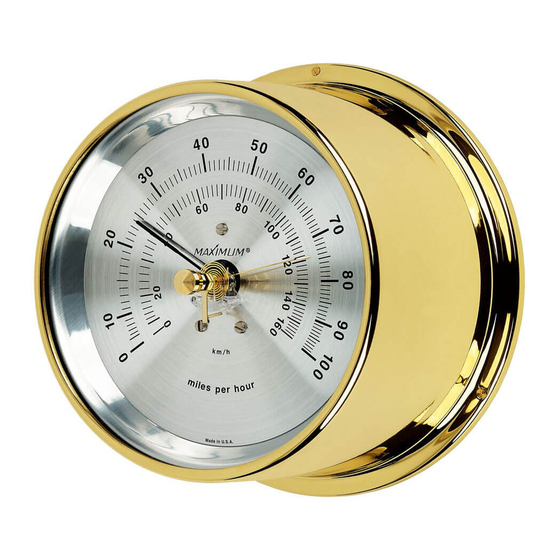
Advertisement
PROPER INSTALLATION IS IMPORTANT. IF YOU NEED ASSISTANCE, C ONSULT A CONTRACTOR
ELECTRICIAN OR TELEVISION ANTENNA INSTALLER (CHECK WITH YOUR LOCAL BUILDING SUPPLY,
OR HARDWARE STORE FOR REFERRALS). TO PROMOTE CONFIDENCE, PERFORM A TRIAL
1
COTTER
PIN
COAT NUTS
WITH SEALANT
WIRE
8 FEET
EVE
MOUNT
WALL
TRIPOD
MOUNT
MOUNT
7
WIRE
Mount the read-out directly over the cable feed-thru-hole
to avoid crimping the wire under the lip. We recommend
mounting the read-out on one of our pre-drilled and
centered wood panels.
info@FLIR-Direct.com
VIGILANT
WIRING BEFORE INSTALLATION.
Determine where you are going to locate both the rooftop
sensor and the read-out.
Feed the teminal lug end of the 2-conductor cable
through the rubber boot and connect the lugs to the
terminals on the bottom of the wind speed sensor.
(DO NOT adjust the nuts that are already on the
sensor). The polarity does not matter.
BOOT
Slide the stub mast through the rubber boot and insert
3
the stub mast into the bottom of the wind speed sensor.
Secure with the cotter pin. Coat all wire connections
with silicone sealant and slip the boot over the sensor.
Secure the sensor and the stub mast to your
antenna mast (not supplied) with the two hose clamps.
Radio Shack and similar stores have a selection of
antenna masts and roof mounting brackets. Choose
VENT-PIPE
a mount that best suits your location and provides at least
MOUNT
eight feet of vertical clearance above objects on the roof.
CHIMNEY
MOUNT
5
Secure the wire to the building using cable clips (do not use
regular staples). Form a drip loop where the wire enters the
hole drilled through exterior wall. Caulk the hole when done.
Feed the cable through the wall to where the read-out is going
to be located. Attach the wires to the rear of the read-out as
shown. (Do NOT adjust the nuts that are already on the meter).
The polarity does not matter.
FLIR-DIRECT
INSTALLATION
Follow the instructions supplied with the antenna
mount and secure the mast to the mount.
2
4
CABLE
CLIPS
6
WIRE
DRIP
LOOP
WIRE
8
WIRE-HOLE
WOOD
PANEL
SCREW
.com
1.888.610.7664
2-CONDUCTOR
CABLE
BOOT
HOSE CLAMPS
MAST
CAULK
SCREW
Advertisement
Table of Contents

Summary of Contents for Maximum VIGILANT
- Page 1 VIGILANT INSTALLATION PROPER INSTALLATION IS IMPORTANT. IF YOU NEED ASSISTANCE, C ONSULT A CONTRACTOR ELECTRICIAN OR TELEVISION ANTENNA INSTALLER (CHECK WITH YOUR LOCAL BUILDING SUPPLY, OR HARDWARE STORE FOR REFERRALS). TO PROMOTE CONFIDENCE, PERFORM A TRIAL WIRING BEFORE INSTALLATION. Determine where you are going to locate both the rooftop sensor and the read-out.
- Page 2 VIGILANT OPERATION The Vigilant is a self-powered wind speed measuring instrument. It does not need batteries or an external power supply. In normal operation, it requires no maintenance. To reset the gust register needle, turn the knob counter-clockwise. Turning the knob counter-clockwise will eventually contact the gust register.
- Page 3 IMPORTANT ADDITIONAL INFORMATION Components: Along with the indicator, the following components are included with this instrument: Rooftop sensor: To insure a clear unobstructed path for the wind to the sensor, it should be mounted on some type of antenna mast at least 8 -10’ above the highest object on your roof. Remember, your roof is also an obstruction and it usually requires at least 8’...
- Page 4 Electrical Damage – Common Causes & Recommended Prevention Electrical damage can be caused by many different factors. Below are some of the more common causes and some suggested methods of minimizing potential problems. Common Causes: Storm Activity – lightening in your area can do damage to your instruments in different ways. The obvious way is due to a direct or nearby strike.

Need help?
Do you have a question about the VIGILANT and is the answer not in the manual?
Questions and answers